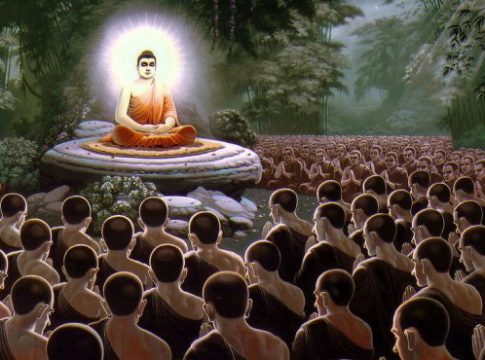The Buddha: Protector of Peace, Opponent of War
By Tam Hoa – 13/11/2019
If greed and hatred are the causes of war, then establishing peace must begin with the eradication of these unwholesome states. However, greed and hatred are not the deepest roots of warfare. At the core lies delusion — the ignorance that blinds one from distinguishing good from evil, benefit from harm.
Throughout his 45 years of teaching and guiding sentient beings, the Buddha’s teachings were later compiled into the Tripiṭaka—the three baskets of scripture. Despite their vastness, the essential message of the scriptures consistently emphasizes the central role of wisdom and compassion. In the Buddha’s mission to liberate beings, wisdom is like the torch lighting the way, and compassion is the act of rescuing others from darkness. The harmony of these two qualities enabled the Buddha to succeed in his spiritual mission and form the core of Buddhist philosophy. These principles were not theoretical but the result of his own spiritual practice, drawn from his lived experiences, both in heart and mind.
In the Bhayabherava Sutta (Discourse on Fear and Dread), the Buddha declared:
“It is right to speak of me thus: ‘He is a being not veiled by delusion, born into this world for the happiness of many, for the welfare of many, out of compassion for the world, for the benefit, well-being, and happiness of gods and humans.’”
In war, there is always a victor and a vanquished. The victor often becomes arrogant and sows further enmity, while the defeated bears suffering and seeks revenge. This is why the Buddha taught:
“Hatred is never appeased by hatred—only by non-hatred is hatred appeased.”
From this teaching, we derive two key insights: First, the Buddha identified himself as a sentient being just like all others, subject to the natural laws of eating, breathing, resting, and sleeping. The difference lies in his mode of perception. Ordinary beings rely on greed, hatred, and delusion as the basis for their decisions, which results in suffering. In contrast, the Buddha approached life through non-greed, non-hatred, and non-delusion—this is wisdom.
Second, the Buddha’s presence in the world was solely for the purpose of awakening beings. Through various skillful means, he shared his wisdom and understanding so that others might attain peace and happiness—this is compassion. Wisdom and compassion are inseparable and constitute the heart of the Buddha’s teaching. In Mahāyāna Buddhism, these qualities later evolved into the Bodhisattva ideal: “To seek enlightenment above and to liberate all beings below.”
The Buddha’s compassion was evident in many ways—from philosophical discourses directed at scholars to everyday teachings offered to common folk. All bore the marks of his loving-kindness and profound wisdom. His advocacy for peace and opposition to war were unwavering. He never condoned any war, even those labeled “righteous”. He forbade his disciples from taking any life under any pretext. Since greed, hatred, and delusion are obstacles to enlightenment, how could one justify spreading hatred in the name of justice?
Whether just or unjust, the consequences of war are equally devastating—not just in open slaughter, but in long-lasting poverty and resentment. The Vietnam War stands as a painful reminder of the war's aftermath. As the Buddha stated in the Saṃyutta Nikāya:
Winning gives birth to hostility.
Losing, one lies down in pain.
The calmed lie down with ease,
having set
winning & losing
aside.
To illustrate the Buddha's firm stance against war, a remarkable account is found in the “Discourse to Vassakāra”, recorded in the Middle-Length Discourses (Majjhima Āgama).
This account tells of King Ajātasattu of Magadha, who once considered launching a military campaign to conquer the Vajjian state (Vajjī). To determine the likelihood of success, he sent his minister Vassakāra to consult the Blessed One.
On this occasion, the Buddha seized the opportunity to prevent further enmity. Instead of offering a direct political or military answer, He skillfully analyzed the political strength of the Vajjians by referencing the Seven Principles for Non-Decline (Satta Aparihāniyā Dhammā). By highlighting the internal unity and moral discipline of the Vajjians, the Buddha dissuaded King Ajātasattu from initiating conflict. In truth, even if the Vajjians had failed to uphold these seven principles, the Buddha would still have opposed war. Why? Because He clearly saw the grave suffering and destruction it causes for the masses. His wisdom aimed not at political gain, but at the ultimate well-being of all sentient beings.
In another instance recorded in the Kasi-Bhāradvāja Sutta, King Ajātasattu, out of greed and desire to expand his territory, waged war against King Pasenadi of Kosala, attempting to seize the city of Kāsi. The result was disastrous—Ajātasattu's army was defeated, his troops were slaughtered, weapons confiscated, and his life was spared only by the grace of his enemy. Humiliated and consumed by vengeance, he constantly sought ways to retaliate. It was in this very context that the Buddha proclaimed the following verse:
“Hatred is never appeased by hatred in this world;
It is appeased only by loving-kindness.
This is an eternal law.”
The Buddha's insight reveals the bitter truth of war: the victor becomes arrogant, breeding more hatred, while the defeated clings to pain and vengeance. War gives birth not only to immediate destruction, but also to lasting resentment, passed down from person to person, generation to generation. This is the devastating cycle of vengeance that plagues humanity.
We need not look far for evidence. Take, for example, the nation of Iraq—though years have passed since the formal end of war, security remains fragile. Terrorism runs rampant, and the lives of civilians are constantly threatened. Ethnic and religious tensions continue to fuel hatred, with suicide bombings becoming a deadly norm. Women, children, and the innocent bear the brunt of the suffering. Who bears responsibility for this? The answer lies not in courts of law, but in the court of human conscience.
The case of Iraq is not isolated. All wars, in all times and places, yield similar consequences—only varying in severity and duration. This is why the Buddha’s teachings emphasize peace and reject war as a solution.
So, according to the Buddha, what is the true cause of war, and how can it be prevented?
In the Discourse on the Aggregates of Suffering, the Buddha clearly states:
“Monks, it is desire that gives rise to conflict—desire is the cause, desire is the condition. Because of desire, kings wage war against kings, nobles against nobles, brahmins against brahmins, householders against householders; parents against children, children against parents; brothers against brothers, friends against friends. Engaged in disputes and violence, they strike each other with fists, stones, sticks, and swords—bringing death and unbearable suffering.”
According to this, greed is the root of all conflict. It manifests in many forms: desire for fame, wealth, power, and sensual pleasures. Even minor disputes—between family members or neighbors—are driven by greed. On a larger scale, this greed escalates into national and global warfare. When reason fails, violence takes its place. In modern times, the advent of nuclear weapons has made the danger even more catastrophic, threatening life on Earth itself.
The Buddha’s view on the origins of war is not merely philosophical; it is profoundly practical. It is not to be evaluated by faith or speculation alone, but tested against the reality of life. To understand the value of the Buddha’s teachings, one must set aside political bias and superficial slogans, and instead examine the true roots of conflict. Only then does the wisdom of the Dharma become clear and applicable.
The Buddha identified greed, hatred, and delusion as the three unwholesome roots of all evil. These give rise to anger, deceit, jealousy, stinginess, manipulation, betrayal, arrogance, obstinacy, and other mental defilements. These defilements lead to unwholesome actions (karma), which in turn generate hatred and war.
From lived experience, we see that disputes almost always stem from the unequal distribution of power, status, or resources. War is no different. However, unlike personal arguments, war is often masked by lofty ideals: justice, morality, national pride. These are often used to deceive the public into supporting violence for the sake of political or personal gain. And tragically, it is the innocent—civilians, the poor, the voiceless—who suffer the consequences, while those who instigate wars remain largely untouched.
If greed and hatred are the causes of war, then true peace can only arise when these defilements are eradicated. However, the Buddha goes deeper. He teaches that the ultimate root of war is delusion—not seeing things as they truly are. Delusion clouds our understanding of right and wrong, benefit and harm. Greed is the desire to possess what is not rightfully ours. Hatred arises when we are forced to encounter what we dislike. Both are shadows cast by ignorance. Hence, delusion is the seed from which greed and hatred grow, which then drive unwholesome speech and action.
In the Discourse on the Inheritance of the Dhamma, the Buddha explains:
“Greed is an unwholesome root. Hatred is an unwholesome root. There is a Middle Path that transcends greed and hatred, bringing about true vision, insight, peace, supreme wisdom, awakening, and Nibbāna. This is the Noble Eightfold Path:
Right View, Right Intention, Right Speech, Right Action, Right Livelihood, Right Effort, Right Mindfulness, and Right Concentration.”
To end war and hatred, we must begin by eliminating the roots of unwholesome conduct—greed, hatred, and delusion—through the practice of the Noble Eightfold Path:
Right View (Sammā Diṭṭhi)
Right Intention (Sammā Saṅkappa)
Right Speech (Sammā Vācā)
Right Action (Sammā Kammanta)
Right Livelihood (Sammā Ājīva)
Right Effort (Sammā Vāyāma)
Right Mindfulness (Sammā Sati)
Right Concentration (Sammā Samādhi)
A true advocate for peace must first develop a righteous worldview. With this view comes wholesome thoughts, which lead to truthful speech and ethical actions. With perseverance and mindfulness, one cultivates wisdom and eliminates inner defilements. Such a person harbors no greed or hatred—and therefore cannot contribute to war.
This is the foundational principle for establishing lasting peace for humanity. From this foundation, concrete measures for conflict prevention and resolution can be developed—ones rooted not in politics or ideology, but in the truth of the Dharma.
“Only in abandoning greed, hatred, and delusion
Can humanity know true peace.”
May this teaching serve as a light to dispel the darkness of war and suffering.
By Thich Hanh Binh
Source: Phatgiao.org.vn
!["[KTMH] Trailer | WHAT TO DO TO MAKE SUMMER HOLIDAYS MORE MEANINGFUL?"](https://i3.ytimg.com/vi/s0VUGa1v6uw/maxresdefault.jpg)
.jpg)


